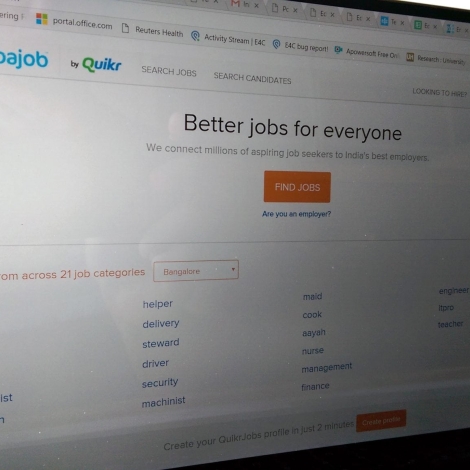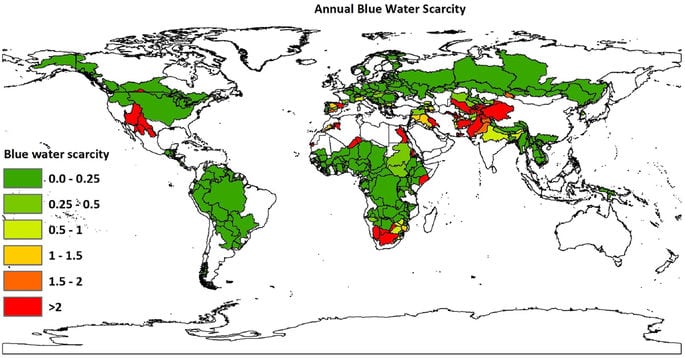In 2004, Anirudh Krishna published a study that changed the life of an American and set off a chain of events that founded a multi-million-dollar business in India. Dr. Krishna, a professor of public policy and political science at Duke University in Durham, North Carolina (USA), studied the reasons why people fell into poverty and how they escaped it in 35 villages in northern India. A key finding – the admittedly obvious one that nevertheless launched an enterprise – was that people can escape poverty when they find a job.
At the time, the finding may not have been unsurprising. Only 7.5 percent of those who escaped poverty owed their success to anti-poverty assistance programs, the study found. Anti-poverty programs were not targeting unemployment. And if they had, that may not have been enough. One of interesting nuances among the study’s findings is that most of the new jobs people obtained were in the informal sector, and most were not full time.
“Finding the job seemed to be a limiting factor. I thought we might accelerate that with technology” – Sean Blagsvedt
In a 25-year period, 11.1 percent of 6376 households studied escaped from poverty. And most of them – 70 percent – did so by diversifying their income, Dr. Krishna wrote in World Development. In those agrarian communities, diversification meant finding new ways to make money from the family farm, or leaving the land to earn money elsewhere. Men and women traveled hundreds of kilometers to Mumbai, Bengaluru, Chennai and Pune to work in carpentry, kitchens, ice cream carts, masonry, plumbing, truck driving, sign painting and other posts in the country’s vast informal economy. And most of the people who found jobs – 64 percent – did so with the help of a friend or relative in a city, the study found.
The limiting factor
“Finding the job seemed to be a limiting factor,” Sean Blagsvedt says. “I thought we might accelerate that with technology.”
Mr. Blagsvedt was working at Microsoft and traveling in India when he saw Dr. Krishna’s paper. It changed his life, he says. Soon after, he co-founded Babajob, a job-search website with a suite of digital tools for finding work in India, especially informal work. Babajob launched in beta in 2007 then nationwide in 2009, and it was acquired by its competitor, Quikr, in May 2017. In that journey from launch to acquisition, Babajob created new technological tools for connecting people to jobs that they need to escape poverty, and those innovations persist in the hands of Babajob’s buyer.
“Soon after we started, I was running it in my living room and the maid of a downstairs neighbor asked what we were doing. She asked if she could register. She had never used a computer before, but we signed her up and she found a job that paid 30 percent more and was closer to her house,” Mr. Blagsvedt says. His neighbor was annoyed, but, he pointed out, Babajob had a way to contact hundreds of other maids looking for work nearby.
“If people have information from a transparent marketplace, they can make better decisions and be happier.”
The maid’s experience was not unusual. People who used Babajobs chose jobs that paid an average of 20 percent more than their last job, and they were able to reduce their commute by 14 minutes per day.
“If people have information from a transparent marketplace, they can make better decisions and be happier,” Mr. Blagsvedt says.
Jobs for millions
At its public launch in 2009, Babajob served 120,000 registered users and offered 320,000 jobs, adding 900 each day. They were the largest online source of blue-collar jobs in India. In the company’s 11 years, it accumulated 9 million job seekers, 500,000 employers and virtually invented a blue-collar category of job offers in India, attracting almost 1% of the country’s population, Mr. Blagsvedt says.
Growth came at a cost. Mr. Blagsvedt sold his house to put (USD) $250,000 into the company. Then they offered an investment round for friends and family in 2010, followed by a social impact investment round that attracted USAID, and finally found a strategic investor in SEEK, Australia’s largest job-searching site, before selling to Quikr.
“You could post a job and in a matter of 20 minutes people could be calling you who are qualified and interested.”
“We thought it was better to combine forces and make a go at this,” Mr. Blagsvedt says.
Digital tools to connect the unconnected
The company set itself apart from other job search sites with tools that helped people use the service. In 2007 when they launched, poor rural Indians did not use the Internet like they do today. The company experimented with tactics such as mentor systems that pay a referral fee when someone is hired on the recommendation of another person, and automated telephone systems with push-button lists.
“Even if people couldn’t speak English or read English, they should be able to take advantage,” Mr. Blagsvedt says.
The telephone system evolved into a product for job creators. When a business with an opening posted a job, Babajob automatically pushed it to qualified applicants. The applicants called Babajob’s system and answered questions to screen for relevancy.
“A delivery guy? Then we ask if you have a bike and availability in a certain region for 10 hours a day, for example,” Mr. Blagsvedt says. “You could post a job and in a matter of 20 minutes people could be calling you who are qualified and interested.”
Babajob developed a mobile application that works offline in four languages so that it remains functional in India’s spotty mobile network. Then they targeted job seekers who use Facebook Messenger. They wrote scripts that incorporated Google’s voice recognition tools to allow Facebook users to build a job profile and connect with employers. At its peak, they had 10,000 users active each day on that single service.
Some of its tools have broader applications. Babajob created an algorithm that scans a government-issued personal identification card and judges its veracity. “It tells you if it’s real or not and links it with a government verification API,” Mr. Blagsvedt says. “We’re putting it out there for anyone else that wants to use it.”
Another tool analyzes a spoken phrase and determines how well a person speaks English. And a third tool is specific to job searches, but the company has also made it available to those who want to use it: A user can answer questions through online chat while a script runs in the background that analyzes responses and serves up jobs available in the person’s field and geographic region.
Next steps
While not entirely jobless himself after the sale of his company, Mr. Blagsvedt has taken on an advisory role at Quikr. He has also opted to try his hand at rearing his three-year-old while his wife pursues one of her professional goals in a digital arts festival called Bangalore Fantastic. Meanwhile, the tools he created at Babajobs live on at Quikr, connecting people who were once disconnected to opportunities that pull them out of poverty.


Work India provide best free blue collar jobs in Mumbai. Now they have also include many other cities plus they are expanding in all India.
If you are blue collar or some what white collar like in Computer, Back office or Tele-calling, than it is best compare to other.
Why ?
Because it have selected filleter job post who can give you real job.
Plus they have ban job consultants on their platform.
https://www.workindia.in